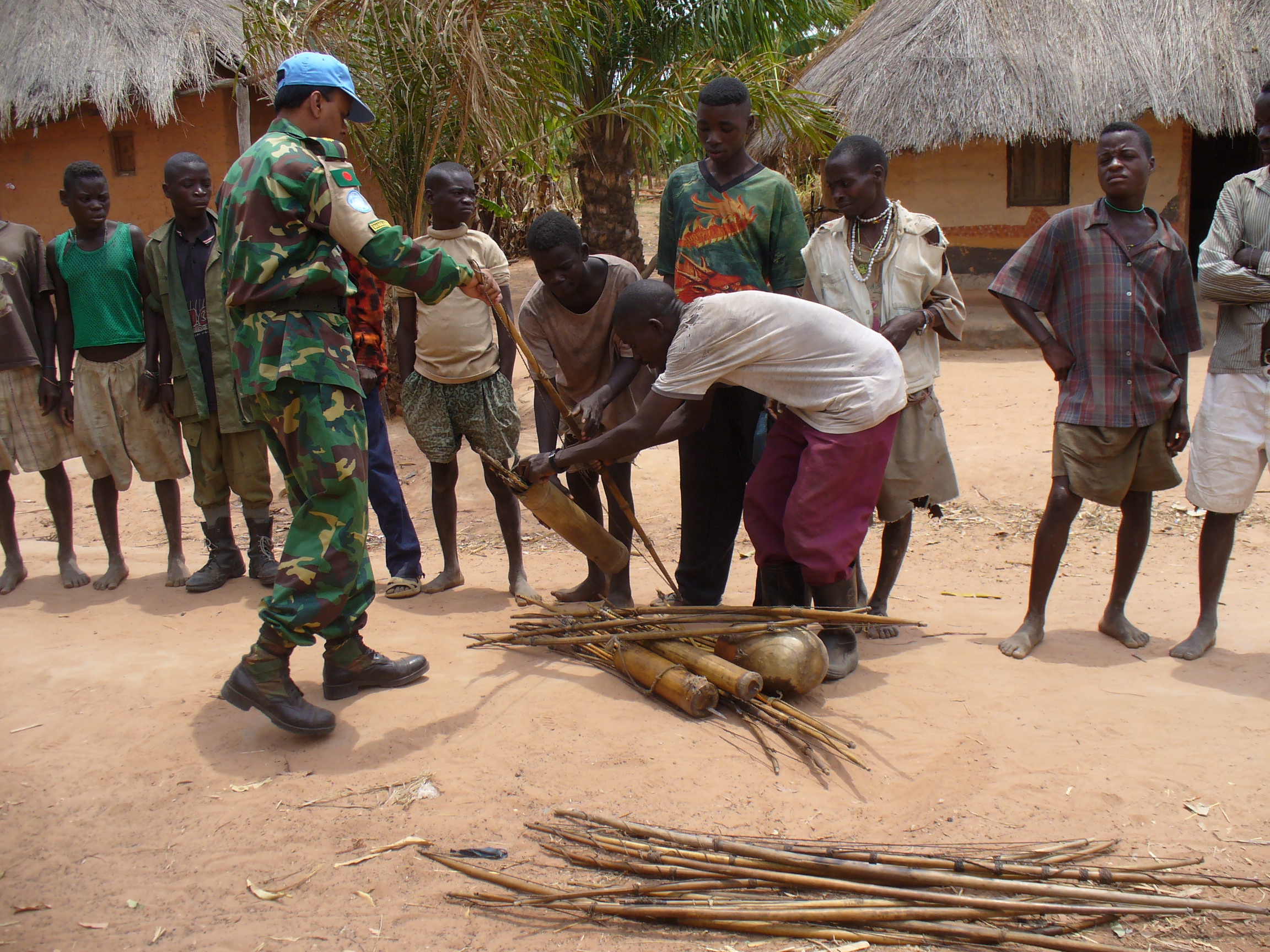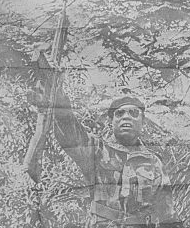|
François Lumumba
François Emery Tolenga Lumumba, alternatively François Hemery Flory, (born 20 September 1951) is a Congolese politician, the son of Patrice Lumumba, and the leader of a faction of the Mouvement National Congolais-Lumumba (MNC-L). François' father Patrice Lumumba was the first Prime Minister of the Democratic Republic of the Congo, but he was overthrown and murdered during the Congo Crisis. Already studying in Egypt for his own safety at the time of the assassination, François Lumumba spent the next decades in exile. He became a leading figure and eventually the party leader of a major faction of the MNC-L, the party of his father. In this position, he attempted to unite various exiled opposition groups and to support rebellions against the Congoloese dictator Mobutu Sese Seko. After Mobutu's downfall in the 1990s, Lumumba returned to the Democratic Republic of the Congo to participate in democratic politics and support efforts to stop the Second Congo War. He has achieved littl ... [...More Info...] [...Related Items...] OR: [Wikipedia] [Google] [Baidu] |
Mouvement National Congolais
The Congolese National Movement (french: Mouvement national Congolais, or MNC) is a political party in the Democratic Republic of the Congo. History Foundation The MNC was founded in 1958 as an African nationalist party within the Belgian Congo. The party was a united front organization dedicated to achieving independence "within a reasonable" time and bringing together members from a variety of political backgrounds in order to achieve independence. The MNC was created around a charter which was signed by, among others Patrice Lumumba, Cyrille Adoula and Joseph Iléo. Joseph Kasa-Vubu notably refused to sign, accusing the party of being too moderate. By the end of 1959, it claimed to have 58,000 members. The MNC was a national party with substantial support in the whole of Congo, while most other parties were based primarily on regional or ethnic allegiances and garnered support in their respective provinces. The MNC was the biggest nationalist party in the Belgian Congo but ... [...More Info...] [...Related Items...] OR: [Wikipedia] [Google] [Baidu] |
Gamal Abdel Nasser
Gamal Abdel Nasser Hussein, . (15 January 1918 – 28 September 1970) was an Egyptian politician who served as the second president of Egypt from 1954 until his death in 1970. Nasser led the Egyptian revolution of 1952 and introduced far-reaching land reforms the following year. Following a 1954 attempt on his life by a Muslim Brotherhood member, he cracked down on the organization, put President Mohamed Naguib under house arrest and assumed executive office. He was formally elected president in June 1956. Nasser's popularity in Egypt and the Arab world skyrocketed after his nationalization of the Suez Canal Company and his political victory in the subsequent Suez Crisis, known in Egypt as the ''Tripartite Aggression''. Calls for pan-Arab unity under his leadership increased, culminating with the formation of the United Arab Republic with Syria from 1958 to 1961. In 1962, Nasser began a series of major socialist measures and modernization reforms in Egypt. Despite setba ... [...More Info...] [...Related Items...] OR: [Wikipedia] [Google] [Baidu] |
Mai-Mai
The term Mai-Mai or Mayi-Mayi refers to any kind of community-based militia group active in the Democratic Republic of the Congo (DRC) that is formed to defend local communities and territory against other armed groups. Most were formed to resist the invasion of Rwandan forces and Rwanda-affiliated Congolese rebel groups, but some may have formed to exploit the war to their own advantage by looting, cattle rustling or banditry. Groups that fall under the umbrella term "Mai-Mai" include armed forces led by warlords, traditional tribal elders, village heads and politically motivated resistance fighters. Because Mai Mai have only the most tenuous internal cohesion, different Mai-Mai groups allied themselves with a variety of domestic and foreign government and guerrilla groups at different times. The term Mai-Mai refers not to any particular movement, affiliation or political objective but to a broad variety of groups. The name comes from the Swahili word for water, "maji". Militi ... [...More Info...] [...Related Items...] OR: [Wikipedia] [Google] [Baidu] |
Laurent-Désiré Kabila
Laurent-Désiré Kabila () (27 November 1939 – 18 January 2001) or simply Laurent Kabila ( US: ), was a Congolese revolutionary and politician who was the third President of the Democratic Republic of the Congo from 1997 until his assassination in 2001. A longtime opponent of Mobutu Sese Seko, he led the Alliance of Democratic Forces for the Liberation of Congo (ADFLC), a Rwandan and Ugandan-sponsored rebel group that invaded Zaire and overthrew Mobutu during the First Congo War from 1996 to 1997. Having now become the new president of the country, whose name was changed back to the Democratic Republic of the Congo, Kabila found himself in a delicate position as a puppet of his foreign backers. The following year, he ordered the departure of all foreign troops from the country to prevent a potential coup, leading to the Second Congo War in which his former Rwandan and Ugandan allies began sponsoring several rebel groups to overthrow him including the Rally for Congolese Demo ... [...More Info...] [...Related Items...] OR: [Wikipedia] [Google] [Baidu] |
First Congo War
The First Congo War, group=lower-alpha (1996–1997), also nicknamed Africa's First World War, was a civil war and international military conflict which took place mostly in Zaire (present-day Democratic Republic of the Congo), with major spillovers into Sudan and Uganda. The conflict culminated in a foreign invasion that replaced Zairean president Mobutu Sese Seko with the rebel leader Laurent-Désiré Kabila. Kabila's uneasy government subsequently came into conflict with his allies, setting the stage for the Second Congo War in 1998–2003. Following years of internal strife, dictatorship and economic decline, Zaire was a dying state by 1996. The eastern parts of the country had been destabilized due to the Rwandan genocide which had perforated its borders, as well as long-lasting regional conflicts and resentments left unresolved since the Congo Crisis. In many areas state authority had in all but name collapsed, with infighting militias, warlords, and rebel groups (some sy ... [...More Info...] [...Related Items...] OR: [Wikipedia] [Google] [Baidu] |
Congolese National Liberation Front
The Congolese National Liberation Front (french: Front de libération nationale congolaise, FLNC) is a political party funded by rebels of Katanga Province, Katangese origin and composed of ex-members of the Katangese Gendarmerie. It was active mainly in Angola and Zaire during the 1970s. The FLNC was formed in Angola under the leadership of Nathaniel Mbumba, with the goal of expelling Mobutu Sese Seko, the leader of Zaire. The FLNC is best known for its two attempted invasions of Katanga Province (renamed Shaba) in Zaire in 1977 and 1978. These incursions, which threatened Mobutu's regime, sparked two international wars, Shaba I and Shaba II, further complicating the Angolan Civil War. The FLNC became a member of the political life of Zaire after the year 1991, and then later a member of the Democratic Republic of the Congo. Foundation The FLNC originated as the Katangese Gendarmerie, the military of the secessionist State of Katanga during the Congo Crisis. After the defeat ... [...More Info...] [...Related Items...] OR: [Wikipedia] [Google] [Baidu] |
Front For The Liberation Of Congo – Patrice Lumumba
Front may refer to: Arts, entertainment, and media Films * ''The Front'' (1943 film), a 1943 Soviet drama film * ''The Front'', 1976 film Music *The Front (band), an American rock band signed to Columbia Records and active in the 1980s and early 1990s *The Front (Canadian band), a Canadian studio band from the 1980s Periodicals * ''Front'' (magazine), a British men's magazine * '' Front Illustrated Paper'', a publication of the Yugoslav People's Army Television * Front TV, a Toronto broadcast design and branding firm * "The Front" (''The Blacklist''), a 2014 episode of the TV series ''The Blacklist'' * "The Front" (''The Simpsons''), a 1993 episode of the TV series ''The Simpsons'' Military * Front (military), a geographical area where armies are engaged in conflict * Front (military formation), roughly, an army group, especially in eastern Europe Places * Front, California, former name of Brown, California * Front, Piedmont, an Italian municipality * The Front, now pa ... [...More Info...] [...Related Items...] OR: [Wikipedia] [Google] [Baidu] |
Tripoli, Libya
Tripoli (; ar, طرابلس الغرب, translit= Ṭarābulus al-Gharb , translation=Western Tripoli) is the capital and largest city of Libya, with a population of about 1.1 million people in 2019. It is located in the northwest of Libya on the edge of the desert, on a point of rocky land projecting into the Mediterranean Sea and forming a bay. It includes the port of Tripoli and the country's largest commercial and manufacturing center. It is also the site of the University of Tripoli. The vast barracks, which includes the former family estate of Muammar Gaddafi, is also located in the city. Colonel Gaddafi largely ruled the country from his residence in this barracks. Tripoli was founded in the 7th century BC by the Phoenicians, who gave it the Libyco-Berber name ( xpu, 𐤅𐤉𐤏𐤕, ) before passing into the hands of the Greek rulers of Cyrenaica as Oea ( grc-gre, Ὀία, ). Due to the city's long history, there are many sites of archeological signi ... [...More Info...] [...Related Items...] OR: [Wikipedia] [Google] [Baidu] |
Zaire
Zaire (, ), officially the Republic of Zaire (french: République du Zaïre, link=no, ), was a Congolese state from 1971 to 1997 in Central Africa that was previously and is now again known as the Democratic Republic of the Congo. Zaire was, by area, the third-largest country in Africa (after Sudan and Algeria), and the 11th-largest country in the world. With a population of over 23 million inhabitants, Zaire was the most-populous officially Francophone country in Africa, as well as one of the most populous in Africa. The country was a one-party totalitarian military dictatorship, run by Mobutu Sese Seko and his ruling Popular Movement of the Revolution party. Zaire was established following Mobutu's seizure of power in a military coup in 1965, following five years of political upheaval following independence from Belgium known as the Congo Crisis. Zaire had a strongly centralist constitution, and foreign assets were nationalized. The period is sometimes referred to ... [...More Info...] [...Related Items...] OR: [Wikipedia] [Google] [Baidu] |
Photograph Of Nathanael Mbumba, 1978
A photograph (also known as a photo, image, or picture) is an image created by light falling on a photosensitive surface, usually photographic film or an electronic image sensor, such as a CCD or a CMOS chip. Most photographs are now created using a smartphone/camera, which uses a lens to focus the scene's visible wavelengths of light into a reproduction of what the human eye would see. The process and practice of creating such images is called photography. Etymology The word ''photograph'' was coined in 1839 by Sir John Herschel and is based on the Greek φῶς (''phos''), meaning "light," and γραφή (''graphê''), meaning "drawing, writing," together meaning "drawing with light." History The first permanent photograph, a contact-exposed copy of an engraving, was made in 1822 using the bitumen-based "heliography" process developed by Nicéphore Niépce. The first photographs of a real-world scene, made using a camera obscura, followed a few years later at Le Gras, Fra ... [...More Info...] [...Related Items...] OR: [Wikipedia] [Google] [Baidu] |








